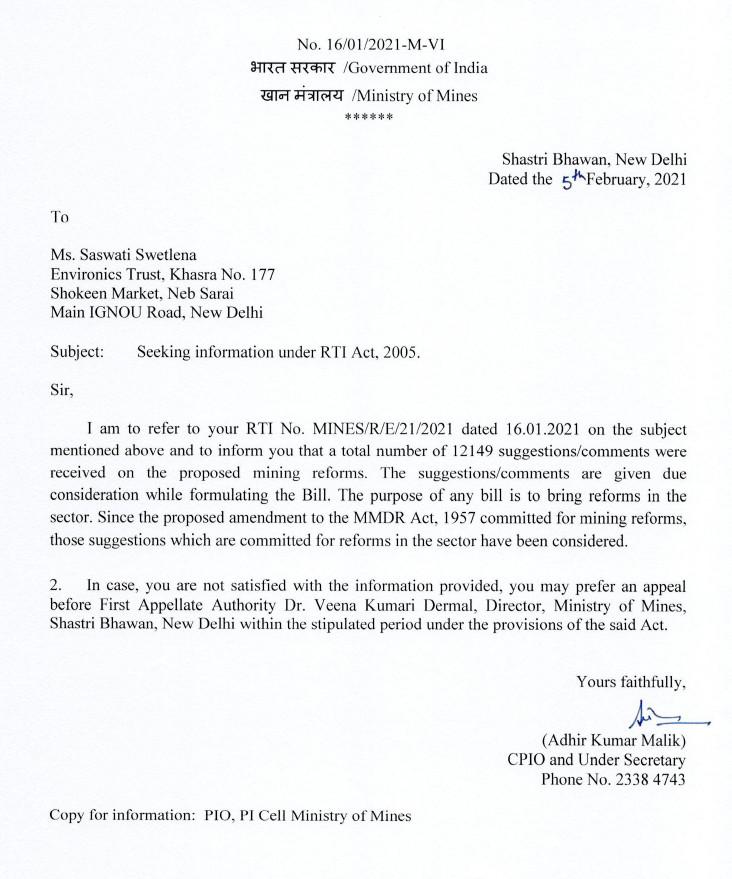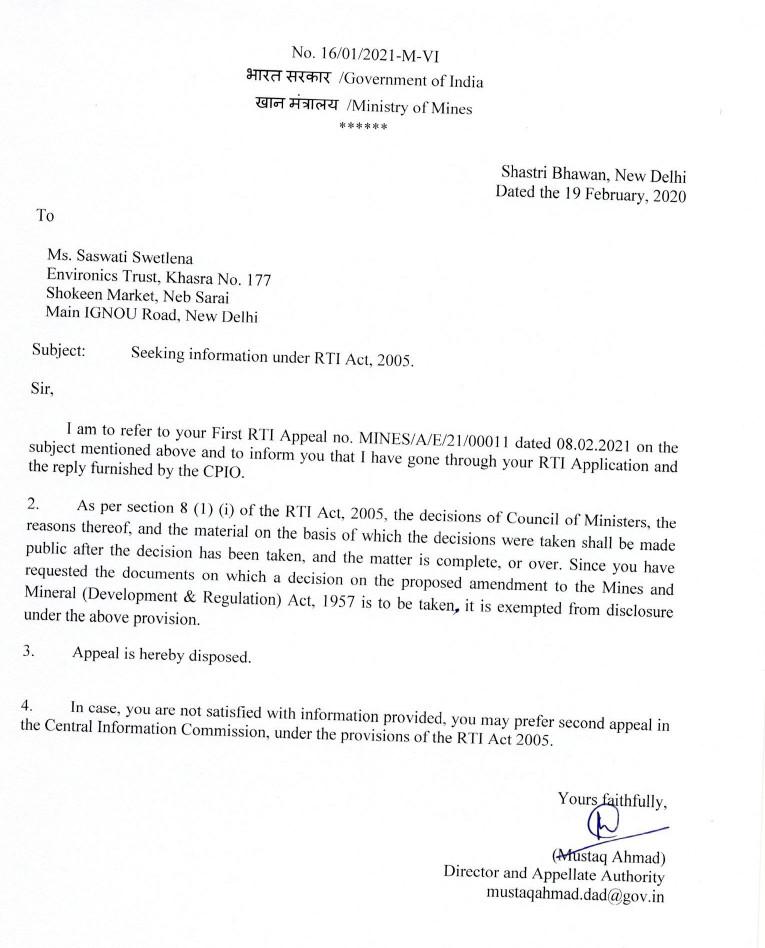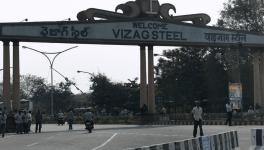Did Ministry of Mines Disregard Critical Suggestions on Mining Reforms?
Bengaluru: On January 13, the Union Cabinet approved a proposal by the Ministry of Mines for a set of wide-ranging reforms in the mines and minerals sector. The reforms that had been initially announced by Minister of Finance Nirmala Sitharaman in May, as a part of the COVID stimulus package, were formulated by the Ministry of Mines and placed before the public for comments in August 2020.
Under usual processes of public consultations, the ministry is expected to have assessed all the comments, suggestions and recommendations that it received from the public on the proposed reforms, prior to finalising the proposal and seeking Cabinet approval. However, in response to an application filed under the Right to Information Act (RTI), the ministry has revealed that of 12,149 submissions that it received, it considered only those that were “committed for reforms,” suggesting that it ignored other submissions that criticised or questioned the proposed reforms.
The RTI application filed by the Mineral Inheritors Rights Association (MIRA), an association of civil society organisations, had asked the ministry how many comments it had received, how those comments were assessed, and whether any of the suggestions and recommendations received by the ministry had been incorporated in the final reforms proposal prepared for the Cabinet by it.
No Answers
The RTI application that was filed by Saswati Swetlana, national coordinator of Mineral Inheritors' Rights Association (MIRA), also asked the ministry to provide detailed reasoning for incorporating or dismissing suggestions that it received into the final proposal for reforms.
Responding to MIRA, Adhir Kumar Malik, the Central Public Information Officer at the Ministry of Mines wrote: “A total number of 12,149 suggestions/comments were received on the proposed mining reforms. The suggestions/comments are given due consideration while formulating the [amendment] bill.”
However, he carries on, “the purpose of any bill is to bring reforms in the sector. Since the proposed amendment to the Mines and Minerals (Development and Regulation) (MMDR) Act, 1957 committed for mining reforms, those suggestions which are committed for reforms in the sector have been considered.”

How did the ministry assess which suggestions were ‘committed for reforms?’ This is the question MIRA asked in appeal to Veena Kumar Dermal, the Director of the Ministry of Mines, who is the designated First Appellate Authority under the RTI Act.
The appeal asked how the comments/suggestions were classified, on what basis, and who was the responsible authority to assess the comments resulting in accepting or dismissing them? The appeal also asked the ministry to clarify what ‘committed to reforms’ means. In addition, the appeal asked that the ministry share all responses with the applicant in digital format.
The appellate authority, however, disposed of MIRA’s appeal stating that under Section 8 (1) (i) of the RTI Act, “the decisions of the Council of Ministers [the Cabinet], the reasons thereof, and the material on the basis on which the decisions were taken shall be made public after the decision has been taken and the matter is complete or over.” Accordingly, the response continues, the details requested are exempted from disclosure.

Speaking to NewsClick, Swetlana said: “We strongly oppose this. What is the definition of ‘committed to reforms?’ That should be told to the public. Does it mean only the suggestions by those who agree to the proposed amendments were considered?”
“Those who might have differing opinions are also committed to reforms. It should, however, be to the benefit of the communities who are the owners of these minerals and other natural resources,” she added.
Controversial Reforms
The structural reforms in the mines sector have been the subject of vigorous criticism by environmentalists, activists for the rights of mining affected peoples, and adivasi rights activists.
The reforms include doing away with the distinction between the captive and non-captive mines for future auctions, reallocation of non-producing blocks of state-owned firms, and amending some sections of the Mines and Minerals (Development and Regulation) Act to help auction more mines.
The reforms also allow private sector companies to undertake exploration and prospecting, raise the limit of how much of a mineral excavated at an existing captive mine can be sold commercially by the miner, beyond their specified captive use, from 25% to 50%, and narrow the definition of illegal mining.
In addition, the reforms set up the National Mineral Exploration Trust an autonomous body to expedite exploration, and a National Mineral Index to develop a comprehensive and broad-based system for determining levies and taxes to be charged for different mining operations, along the lines of the recently launched National Coal Index.
With only 10 days given for submitting responses to the ministry’s draft proposal released in August 2020 as NewsClick has reported earlier (that was later extended by another week), the first set of criticism was for the process itself, with activists alleging the process was violating the government’s pre-legislative consultations policy by not providing enough relevant data with the proposed reforms, not providing enough time for the public to gather all the relevant information to submit their responses, and by not providing the draft proposal in translations to local languages of mining affected peoples.
Subsequently, the proposal was criticised in several submissions sent in response to the ministry. Detailed reports by NewsClick, Mongabay, Scroll.in and others spelt out the criticisms sent to the ministry by environmentalists and adivasi activists and advocates suggesting that the reforms were focused on short-term gains for corporates, did not focus on key areas of concern with regards to India’s long-term strategic goals in the mines and minerals sector, and elided the concerns of mining affected people, particularly adivasi communities.
Rushing Through More Reforms
In the past two months, the ministry has notified four further draft reforms: the proposed Draft Mineral Concession Rules 2021 that will bring two proposed amendments to the Mineral Concession Rules 2016, the Draft Mineral Auction (Amendment) Rules, and the Draft Additional Amendment Proposals to the MMDR Act, 1957.
While the proposed amendments to the Mineral Concession Rules are aimed at dealing with mining license holders that had failed to operationalise their mines and were in cases stuck for years in litigation by easing the conditions under which leases can be terminated and transferred, and the amendment to the auction rules offered a financial incentive to private companies that will seek to participate in minerals auctions, the proposed amendments to the MMDR Act are substantial.
In an earlier detailed report on NewsClick, the proposed MMDR amendments have been described as “an attempt apparently aimed at helping corporate houses appropriate a greater pie of natural resources of the country. The proposed amendments allow the Centre to auction mineral blocks that belong exclusively to states. The amendments “provide the power to central government to conduct auction (of mineral blocks) in cases where the State governments face challenges in conduct of auction or fail to conduct auction.”
Regarding these, Swetlana said: “Even in the case of these amendments that were proposed in January and February the Ministry of Mines didn’t adhere to the Indian government’s Pre-Legislative Consultation Policy. They are not giving enough time to file RTI applications, nor are they giving the relevant data and information to assess their proposals. They are neither considering any audit recommendations by the CAG (Comptroller and Auditor General of India), nor the reports by the Public Accounts Committee or the Parliamentary Standing Committee. The basic democratic process is being violated. If the government is disregarding the views of anybody who would have a different opinion regarding the proposed reforms, we consider the process a failure.”
The author is an independent journalist.
Get the latest reports & analysis with people's perspective on Protests, movements & deep analytical videos, discussions of the current affairs in your Telegram app. Subscribe to NewsClick's Telegram channel & get Real-Time updates on stories, as they get published on our website.
























